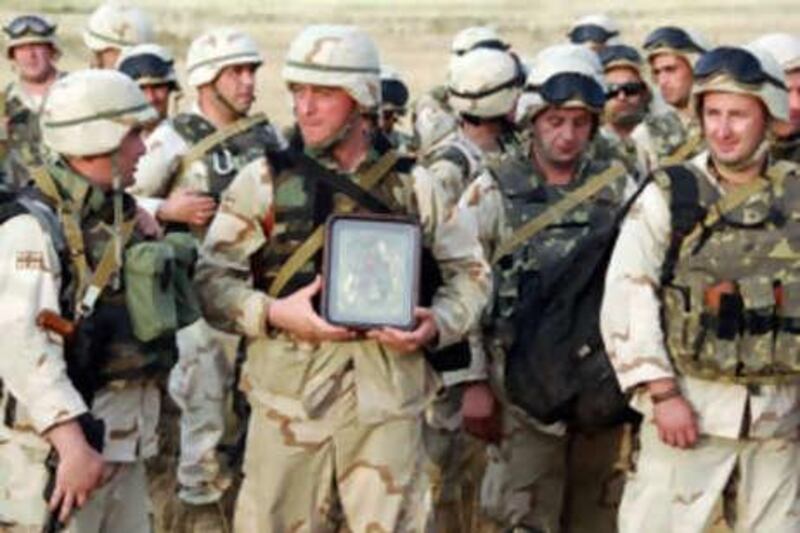WASIT, IRAQ // Hundreds of Georgian soldiers have been pulled out of southern Iraq and sent home because of the conflict over the breakaway province of South Ossetia. US military transporters began airlifting the troops back to Georgia on Sunday, in a redeployment operation that continued yesterday morning despite Russian protests. "I regret that some of our partners are not helping us, but in fact are trying to impede us," said Vladimir Putin, the Russian prime minister. "I am referring to the US transfer, aboard its military transport planes and directly into the conflict zone, of the Georgian military contingent from Iraq."
Georgia has been a close ally of the United States, which helped to train and equip its army, and was one of a handful of countries to send forces into Iraq as part of the US occupation. With about 2,000 troops in Iraq, it was the second largest contributor to the shallow US coalition after Britain. The majority of the Georgian force was stationed in Wasit province, south of Baghdad, where they manned checkpoints designed to intercept any weapons being smuggled from neighbouring Iran.
Georgia and Russia are effectively at war after Georgian troops moved to reclaim the breakaway region of South Ossetia, sparking a massive Russian military response. Heavily outnumbered and outgunned, Georgia decided it needed all of its forces on the domestic front. Last night, however, it seemed the military part of the conflict was over. Although the Georgians' withdrawal was unplanned, Iraqis here said they did not expect to see a worsening security situation as a result. Wasit has been relatively stable for some time, despite flare-ups of violence in Kut and Wasit city, mainly involving rival Shiite factions.
"I don't see this will have any effect on us," said Iraj Sammak, deputy chairman of Wasit's governing council. "Security is good, and we have established the rule of law here." Mr Sammak said Georgian troops had not been involved in recent military operations against the Mahdi Army militia in the province, an indication that Iraqi forces were capable of working without them. "They were mainly manning checkpoints on the roads connecting Iran and Baghdad," he said. "Decisions will soon be made about what will be done to replace them."
Walid Enaeed, head of Wasit's social services council, welcomed the unexpected redeployment, especially given that US and Iraqi authorities continue to negotiate over the status and presence of US forces in the country. "It will give us an opportunity to demonstrate that we are not just reliant on foreign troops, and that Iraqis are capable of managing themselves," he said. "The time has come for Iraq to be responsible for its own security."
Other Iraqis who spoke to The National said they were pleased to see the back of the Georgian troops, who appeared to have left all of their checkpoints and base, known as Camp Delta, by yesterday. "I can say they only ever made problems," said Walid Jassem, a Wasit-based business man. "I have new-model cars and whenever they saw someone at a checkpoint who they thought was rich, they would ask for money.
"I don't think they had any effect on stopping thefts or militias." His claim of corruption among the soldiers could not be independently verified, but he was adamant that requests for money were made of him on a regular basis. "I've got no sympathy for them," he said. "It serves them right to have to go and fight the Russian army; I hope they are crushed." Georgian soldiers did not enjoy a good reputation locally, and were widely seen as rude and ill educated because few spoke Arabic or English.
According to US military statistics, the Georgian brigade searched 175,291 vehicles, 792,859 people and had conducted 2,469 patrols in southern Iraq since the end of October. It also had units stationed in Diyala, north-east of Baghdad, regarded as the most dangerous area in Iraq. They guarded a bridge near the notorious town of Baqubah, which has seen fierce sectarian fighting between Sunni and Shiite militants, as well as government forces .
Five Georgian soldiers have been killed - three of them this year - in combat-related incidents. US commanders in Iraq paid tribute to the Georgian contingent for backing the war in Iraq. "We want to thank them for the great support they've given the coalition, and we wish them well," said Rear Admiral Patrick Driscoll, a US military spokesman, at a press conference in the Iraqi capital. @Email:nlatif@thenational.ae






